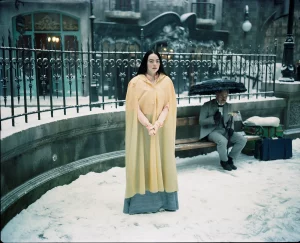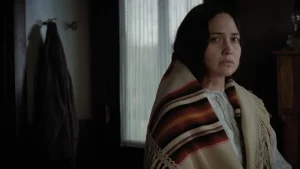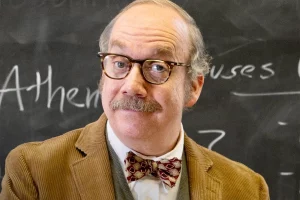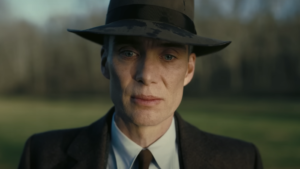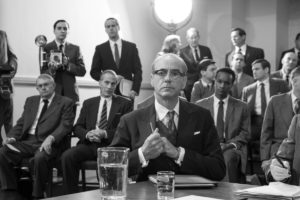
The one thing I can still remember poor Jo Koy saying at his much-derided hosting stint at this year’s Golden Globe Awards came at the very end when he exulted, “Hollywood is back!” Not even crickets could be heard acknowledging this statement, which made me, at least, wonder whether even Hollywood thinks it’s back. A Socratic temperament might press for terms to be defined: What do you mean by “Hollywood”? What do you mean by “back”? “Back” from what? From COVID? From the contract disputes? From the looming specter of A.I.? And is this what being “back” looks like?
It is a certainty that all those who work in the Factory of Dreams are back at their jobs, which means they can campaign and vote in all their various trade competitions leading up to the Academy Awards. But if by “Hollywood,” you mean, the “screwy, ballyhooey Hollywood” of klieg lights, big screens, and its ersatz royalty of big stars…well, only a sentimental naïf wouldn’t have by now figured out that gossamer myth dissipated into the ozone several decades ago and whatever tiny fragments remain are deflating hour by hour in a post-Millennial universe where, as somebody on the recently-completed fifth season of FX’s Fargo might put it, we all get to create our own reality while feeling empowered to throw big, sharp rocks at everybody else’s.
How can any movie, Hollywood or independent, presume to grab a lion’s share of a consensus audience in a determinedly fragmented world like ours? For a while this past summer, Barbie appeared to have pulled it off triumphantly enough to have given Warner Bros. a breathtaking surge in its profit margin. But before long, we stopped having serious fun with the movie and started getting frivolously solemn over whether it was OK to enjoy ourselves so much over such a conspicuous, if cheekily self-referential example of “product placement.” And we’re still arguing about it with one side of the room grousing about Oscar keeping both the movie’s star Margot Robbie and its director Greta Gerwig out of the running while others bloviate about arrested development and whether the whole thing was post-feminist or post-post-feminist, or yet another marker in civilization’s dreary slouch towards Bethlehem.
I shall, of course, deal further with Barbie in the text below. As far as how I liked it, I need only quote the indispensable cultural critic Robert Warshow who is famous for saying the following: “A man watches Barbie, and the critic must acknowledge that he is that man.” OK, I made up the Barbie part. But somehow the original quote, a standby among cinephiles for generations, makes more sense when put this way, at least to me.
The critic that I like to think I still am enjoys the ongoing threads and conversations as they unspool on various platforms. But conversation, after a while, gives way to a kind of annoying “know-it-all”-ism requiring nothing more than loud, emphatic assertions of opinion with little to no room for challenges or even questions from the floor. Often, it’s jaded contrarianism without portfolio (literally) as if standing in opposition to the crowd, or merely believing that you do, is all you need to bring to the microphone. I want more than that. And we should, too, without worrying about how our opinions look to others and how our judgments will be judged in turn.
And if we do like something that everybody else likes, we shouldn’t have to apologize for it in the same way we shouldn’t have to apologize for liking things nobody else cares for. All that is part of what used to be the romance of moviegoing and in romance, looking or feeling foolish is always a liability. But you don’t move anywhere without such risks and neither does art. If we could stop being so self-conscious about what we wear in the digi-verse, we could all come back to the rapture we felt when we first sat down in a dark room waiting for transport. The movies, as we knew them, could truly be “back” – and so, maybe, could Hollywood.
Wait for it…wait for it…
Naaaah!
You know the drill by now. Projected winners are in bold and FWIW (For Whatever It’s Worth) asides will follow some predictions, as needed.
Best Picture
American Fiction
Anatomy of a Fall
Barbie
The Holdovers
Killers of the Flower Moon
Maestro
Oppenheimer
Past Lives
Poor Things
The Zone of Interest
As Barbie continued to dominate industry chatter well into the new year, I wondered whether Academy voters would do the Wild Thang (sic) and give it the top prize, partly to mollify those who think director Greta Gerwig and lead actress Margot Robbie got skunked out of nominations and mostly to give props to its galvanic impact on the Almighty Bottom Line. But devoted followers of this site will recall that a year ago, I believed Top Gun: Maverick would reap voters’ good will for its olly-olly-oxen-free shoutout to audiences that it was not only safe, but mandatory to return to the multiplexes in the pandemic’s wake. I’m not making that mistake a second time. Oppenheimer fits the Oscar prototype for a major movie whose significance surfaces before the movie even begins. The same can be said, even more so, for Scorsese’s Good Fellas of the Purple Sage (my own name for it and I mean no disrespect.). Voters have tended to seek the comfort of Big Important Topics as a way of putting the industry’s best possible face forward into its future. I’m opting now for the one whose importance would have been timelier back in the 1980s in the last tense days of the Cold War. But never mind. Right now, its front-runner status here is secure, even after more than half a year.
FWIW: Despite pundits’ best efforts to coax this year’s categories into wire-to-wire finishes (as they are prone to do), I suspect this is one of those Years of Foregone Conclusions as far as handicapping Oscars is concerned. In other words, chalk is your wisest investment. The past year has so exhausted the industry that it’s hard to imagine any of the nominated films, their casts and crews suddenly catching fire towards the finish line. There’s been enough excitement from all these shutdowns and strikes this past year, thank you very much. Let’s just worry about catching up and getting back to whatever this New Normal in the industry is concerned because there’s an awful lot of stuff to make everybody nervous about the future. So, who needs horse races? Let’s leave them to actual horses.
In case anybody’s interested, Poor Things would get my vote, simply because I had a blast watching all that grotesque slapstick and baroque comedy slithering out of the screen like tentacles. Yorgos Lanthimos’ movie goes about its sticky, gnarly business the way Willem Dafoe’s deformed Doc Baxter went about his: so absorbed in its own process as to be coolly indifferent to the effect it’s having on its incredulous onlookers. It won’t win here, but I’m tickled that I saw it if for no other reason that it gives me added incentive to actually read more Alastair Grey this year. Lanark, I think.
Best Director
Jonathan Grazer, The Zone of Interest
Yorgos Lanthimos, Poor Things
Christopher Nolan, Oppenheimer
Martin Scorsese, Killers of the Flower Moon
Justine Triet, Anatomy of a Fall
Nolan has been so routinely unpopular with segments of the critical community (not an oxymoron) that I sometimes think his haters invent reasons not to like any of his movies, even when they work well. With me, it’s always been case by case. Liked Insomnia. Hated Tenet. Admired, without loving, Dunkirk. Loved, without admiring, Interstellar. And on and on. With other directors, as well as craftspeople in various disciplines, it’s a different story. They’ve likely been waiting for just the right moment to give him a party favor and if he doesn’t get it for this one, it’s hard to imagine another chance coming up. Except that directors like him outlast almost everybody else, even, and especially, critics like us.
Best Actress
Annette Bening, Nyad
Lily Gladstone, Killers of the Flower Moon
Sandra Hüller, Anatomy of a Fall
Carey Mulligan, Maestro
Emma Stone, Poor Things
All these contenders went all-out in their performances, and each would have been sure bets in other years with weaker competition. History, however, is opening a wide, clear path for Gladstone to repeat Michelle Yeoh’s coup of a year ago by becoming the first Indigenous American to win a lead-acting Oscar. And, as with Yeoh’s becoming the first Asian-American last year, Gladstone has earned it.
FWIW: Still, part of me wishes I could airlift Bening’s nomination to another year with weaker competition. I thought she deserved to win 13 years ago for The Kids Are Alright, which was her fourth and, till now, most recent Oscar bid in more than 30 years. She’s not quite Glenn Close as far as hard-luck Oscar nominees go, but one fears she’s getting there.
Best Actor
Bradley Cooper, Maestro
Colman Domingo, Rustin
Paul Giamatti, The Holdovers
Cillian Murphy, Oppenheimer
Jeffrey Wright, American Fiction
People look at Holdovers’ promotions and all they can see and hear are other, lesser nostalgic prep school comedies with cranky adults buddying up with drippy students; the most notable example brought up is 1992’s Scent of a Woman, which finally got Al Pacino his Oscar well into the “She’s-got-a-GREAT-ass!” phase of his career. This essay by Olivia Rutigliano says everything that needs saying about why both the movie and Giamatti’s performance are different – and why he’ll be rewarded for it.
FWIW (2/25/24): Or maybe not. Murphy’s SAG and BAFTA awards, in swift succession, now make him the prohibitive favorite — and the movie’s cast award can only accelerate his movie’s chances for a Oscar night sweep.
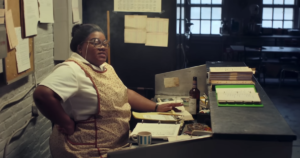
Best Supporting Actress
Emily Blunt, Oppenheimer
Danielle Brooks, The Color Purple
America Ferrara, Barbie
Jodie Foster, Nyad
Da’Vine Joy Randolph, The Holdovers
Randolph’s already a front-runner, principally because she so deftly conveys the complex, mercurial nature of loss, a theme that makes the movie stand out from others in its sub-genre. Also, the way her character’s aching vulnerability is contained beneath dry, if pliable layers.
FWIW: I still wish there were a way to train more attention on some of the other worthy nominees here, especially Ferrara, who to my mind had an even greater challenge in her overall characterization than the people playing dolls.
Best Supporting Actor
Sterling K. Brown, American Fiction
Robert De Niro, Killers of the Flower Moon
Robert Downey Jr., Oppenheimer
Ryan Gosling, Barbie
Mark Ruffalo, Poor Things
I see this as, essentially, Iron Man vs. The Hulk. Iron Man wins.
FWIW: If Wright hadn’t been nominated for Best Actor, I would have liked to see his vulpine rendition of Adam Clayton Powell Jr. in Rustin given its due here. Problem is, everybody else in this category is so formidable that there wouldn’t have been any room for his nomination.
Best Adapted Screenplay
American Fiction
Barbie
Oppenheimer
Poor Things
The Zone of Interest
In case you’re still wondering what Barbie is doing here, this will provide the (illogical, unsatisfying) answer. Whichever category it landed in, the script would have been well-positioned to allow co-writer Gerwig to get the statue for which director Gerwig wasn’t allowed to compete. Too bad in a way because the other “Adapted” nominees are all especially worthy contenders…
FWIW: …especially Cord Jefferson’s script for American Fiction. Even though he’s been scolded by some for paring down the serrated edges of his source material (Percival Everett’s acerbic satire Erasure), he managed to fashion an all-too rare and persuasively level-headed depiction of an upper middle class Black family, balanced, humane, and still witty enough to stand out from anything that came beforehand, if you can think of what that could be.
Best Original Screenplay
Anatomy of a Fall
The Holdovers
Maestro
May December
Past Lives
David Hemingson’s script for Holdovers isn’t perfect. But it makes for the kind of movie that holds its elements loosely enough for voters to cozy up to. Story, structure (of a sort), snappy dialogue, emotional impact. It checks enough boxes to breeze through here.
FWIW: Then again, there’s always the (very slight) chance that a sleeper like Past Lives could ease its way to the front of the pack for having greater, if subtler emotional weight.
Best International Feature
Io Capitano
Perfect Days
Society of the Snow
The Teachers Lounge
The Zone of Interest
Great Britain’s entry is Jonathan Glaser’s chilling, prize-winning depiction of the banality of evil near one of the Nazi death camps. As with recent winners in this category, it also has a Best Picture nomination, which usually means an inevitable win here. 

Best Animated Feature
The Boy and the Heron
Elemental
Nimona
Robot Dreams
Spider-Man: Across the Spider-Verse
By far, the most competitive race on the docket with predictions weaving back and forth between the new meta-Spidey adventure and Hayao Miyazaki’s Boy and the Heron, the latter of which has already collected a Globe along a rasher of critics’ prizes. The other three, including Diz-Pix’s latest, could legitimately be regarded as classics, especially the smart and daring medieval/urban fantasy Nimona, which almost didn’t make it into any kind of distribution. Even with the Marvel Cinematic Universe (MCU) edging towards eclipse at the moment, I’m going to put my chips on Miles Morales, even though it’s plausible that Oscar will wait for the third installment of that series to drop before full acknowledgment.
Best Documentary Feature
Bobi Wine: The People’s President
The Eternal Memory
Four Daughters
To Kill a Tiger
20 Days in Mariupol
Each of these selections carries enough urgency in their socio-political themes to illuminate a whole nation state. All of them deserve to win and any of them could. I’m betting on the AP/Frontline entry whose depiction of a Ukraine city under siege is wrenchingly, frighteningly intimate in its accumulation of raw detail.
Best Cinematography
El Conde
Killers of the Flower Moon
Maestro
Oppenheimer
Poor Things
The relentless march of Oppenheimer ensures that Hoyte Van Hoytema will likely get his first Oscar after his previous work with Nolan’s Dunkirk and Interstellar was nominated but did not win (NBDNW). It’s by no means a lock, but…
Best Original Score
American Fiction
Indiana Jones and the Dial of Destiny
Killers of the Flower Moon
Oppenheimer
Poor Things
Of course, I would love it if Robbie Robertson would get some posthumous love for his haunting, old-weird-America score for Killers; his interludes fit so seamlessly with the scratchy, tinny archival recordings weaved into the soundtrack that you almost believe it all came from the same old 78-RPM records. But it’s easier to imagine Ludwig Göransson’s second win being part of the Oppenheimer wave.
Best Song
“The Fire Inside” (from Flamin’ Hot)
“I’m Just Ken” (from Barbie)
“It Never Went Away” (from American Symphony)
“Wahzhazhe” (from Killers of the Flower Moon)
“What Was I Made For?” (from Barbie)
Outside of production design, this has to be the only sure bet on the table for Barbie, plus it’s already nabbed a Grammy for Song of the Year.

